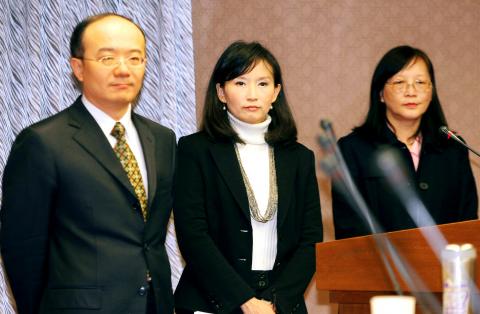The legislature’s Transportation Committee yesterday approved one nominee for the National Communications Commission (NCC), but suspended the review of another because of questions over her qualifications.
Chiang Yu-feng’s (江幽芬) nomination as NCC commissioner is to be confirmed at the plenary session, the committee said, but Wang Yung-ho’s (汪用和) nomination was held up as lawmakers questioned her family’s business ties to Beijing.
Democratic Progressive Party Legislator Kuan Bi-ling (管碧玲) said that Wang Yung-ho’s uncle Wang Chao-yong (汪潮涌) works for a Beijing-based investment firm called ChinaEquity Group and is also an investor in a firm owned by Wang Yung-ho’s father that invests in value-added telecoms services.

Photo: CNA
These connections make Wang Yung-ho “an agent who helps Chinese investors invest in telecom services in Taiwan” and she should not be an NCC commissioner, Kuan said.
Wang Yung-ho said that Wang Chao-yong was a distant relative and that she calls him “uncle” out of respect for the elderly.
As to her father’s business, she said: “I am not sure whether the telecom services [that he invests in] fall under the NCC’s jurisdiction.”
DPP and Chinese Nationalist Party (KMT) lawmakers then reached a consensus to discontinue the review of Wang Yung-ho’s nomination. She was also asked to leave the meeting.
According to Ministry of Economic Affairs data, the company owned by Wang Yung-ho’s father, Wang Da-hua (汪大華), provides conference and exhibition services.
Faced with mounting criticism from the committee over the Executive Yuan’s vetting procedures for the NCC nominee, Executive Yuan Secretary-General Steven Chen (陳士魁) promised to hand in a report within two months.
The controversy over Wang Yung-ho’s qualifications has persisted since the nomination was announced last year.
The new commissioners are to fill in and complete the terms left by the resignation of former commissioners Chang Shi-chung (張時中) and Chen Yuan-ling (陳元玲), who were supposed to serve until next year and 2016 respectively.
Though Wang Yung-ho has extensive experience as a TV news journalist and anchorwoman, her nomination as an NCC commissioner was viewed by many as a political favor. Aside from her being the wife of former KMT legislator Justin Chou (周守訓), Wang Yung-ho’s father also held key positions in the KMT and her brother ran for Taipei City councilor under the KMT banner.
Yesterday, Wang Yung-ho was also questioned if she opposed media monopoly and if she would finish her term.
“I absolutely oppose media monopoly and am determined to serve a full term,” she said.
Asked if she was willing to cancel her KMT membership to be able to serve as a commissioner unfettered by political affiliation, she said: “I don’t think allegations that I was nominated as a political favor would disappear even if I quit the KMT.”
“However, the fact that I am a KMT member will not affect my job as NCC commissioner. I intend to use my performance to win the public’s recognition,” she said.
While Wang Yung-ho’s nomination was riddled with controversy, Chiang sailed through the process, because she has been working as a legal expert at the commission since its establishment in 2006.
Prior to joining the commission, Chiang participated in the deliberation and amendments of three broadcasting acts and the Telecommunications Act (電信法).

Alain Robert, known as the "French Spider-Man," praised Alex Honnold as exceptionally well-prepared after the US climber completed a free solo ascent of Taipei 101 yesterday. Robert said Honnold's ascent of the 508m-tall skyscraper in just more than one-and-a-half hours without using safety ropes or equipment was a remarkable achievement. "This is my life," he said in an interview conducted in French, adding that he liked the feeling of being "on the edge of danger." The 63-year-old Frenchman climbed Taipei 101 using ropes in December 2004, taking about four hours to reach the top. On a one-to-10 scale of difficulty, Robert said Taipei 101

Nipah virus infection is to be officially listed as a category 5 notifiable infectious disease in Taiwan in March, while clinical treatment guidelines are being formulated, the Centers for Disease Control (CDC) said yesterday. With Nipah infections being reported in other countries and considering its relatively high fatality rate, the centers on Jan. 16 announced that it would be listed as a notifiable infectious disease to bolster the nation’s systematic early warning system and increase public awareness, the CDC said. Bangladesh reported four fatal cases last year in separate districts, with three linked to raw date palm sap consumption, CDC Epidemic Intelligence

Two Taiwanese prosecutors were questioned by Chinese security personnel at their hotel during a trip to China’s Henan Province this month, the Mainland Affairs Council (MAC) said yesterday. The officers had personal information on the prosecutors, including “when they were assigned to their posts, their work locations and job titles,” MAC Deputy Minister and spokesman Liang Wen-chieh (梁文傑) said. On top of asking about their agencies and positions, the officers also questioned the prosecutors about the Cross-Strait Joint Crime-Fighting and Judicial Mutual Assistance Agreement, a pact that serves as the framework for Taiwan-China cooperation on combating crime and providing judicial assistance, Liang

US climber Alex Honnold left Taiwan this morning a day after completing a free-solo ascent of Taipei 101, a feat that drew cheers from onlookers and gained widespread international attention. Honnold yesterday scaled the 101-story skyscraper without a rope or safety harness. The climb — the highest urban free-solo ascent ever attempted — took just more than 90 minutes and was streamed live on Netflix. It was covered by major international news outlets including CNN, the New York Times, the Guardian and the Wall Street Journal. As Honnold prepared to leave Taiwan today, he attracted a crowd when he and his wife, Sanni,